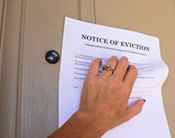HOW TO EVICT A DEFAULTING TENANT
IMPLICATIONS OF ESTATE DUTY
August 5, 2015HOW CONFIDENTIAL IS CONFIDENTIAL?
September 1, 2015 You are an owner of a residential property and have entered into a lease agreement with a tenant. Unfortunately your tenant is unreliable and falls into arrears with the monthly rental. What is your position now and what legal steps can be taken to claim back your property?
You are an owner of a residential property and have entered into a lease agreement with a tenant. Unfortunately your tenant is unreliable and falls into arrears with the monthly rental. What is your position now and what legal steps can be taken to claim back your property?
The Prevention of Illegal Eviction and Unlawful Occupation of Land Act, Act 19 of 1998 (more commonly known as PIE) allows for the eviction of unlawful occupiers of land in the Republic of South Africa. PIE applies to an “unlawful occupier” who is any person who occupies land without the express or tacit consent of the owner of such land. The High and Magistrate’s Court has jurisdiction to grant an eviction order under the provisions of PIE. However, for purposes of this article the Magistrate’s Court process for an eviction will be discussed.
The main eviction application is issued by the Clerk of the Court and a case number is then allocated. This case number is then copied onto an Ex Parte application as well as a Notice in terms of Section 4(2) of PIE. The Ex Parte application is not an interim order, but is rather an interlocutory application where the Court is requested to authorise the Notice in terms of Section 4(2) and also give a service directive for this notice. The Court will then consider the facts of the specific case and give a directive as to what the Court deem as sufficient service of the papers on the land occupier.
Once the Ex Parte order has been obtained the main application as well as the Section 4(2) Notice will be served on the Respondent in terms of the service directive provided by the Court. This service directive will include a directive to serve on the local Municipality as well. It is a requirement of PIE that this notice is served 14 calendar days prior to the hearing of the eviction application. Therefore after successful service and lapsing of the required time period the final eviction application will be heard and granted accordingly. Should the occupant however fail to vacate the premises as directed by the Court Order, the Sheriff of the Court will be authorised by the Court to attend to the eviction of the occupant on or shortly after a specific date.
Compiled by Annerine du Plessis
This article is a general information sheet and should not be used or relied on as legal or other professional advice. No liability can be accepted for any errors or omissions nor for any loss or damage arising from reliance upon any information herein. Always contact your legal adviser for specific and detailed advice.